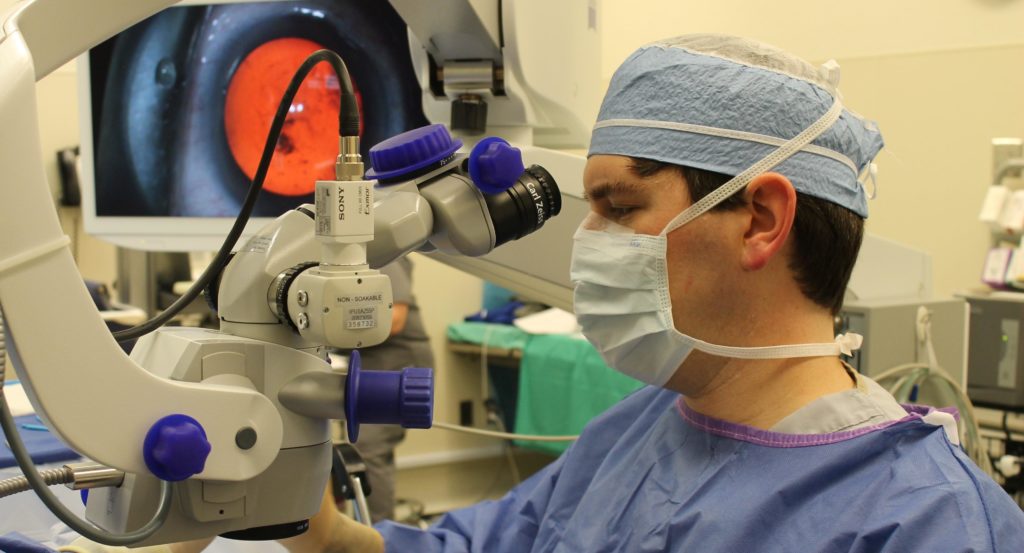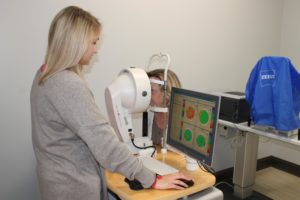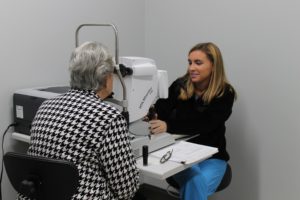Cataracts are a clouding of the eye’s natural lens with aging, but can also be caused from other medical conditions. The most common symptom from cataracts is blurry vision. However, this can manifest in multiple ways that include difficulty with reading, driving, glare symptoms, or other eye difficulties. Confirmation that you have cataracts can be obtained by a thorough exam with your eye doctor.
Cataracts & Astigmatism
Visit the educational website, www.MyCataracts.com, to learn about the advancements in cataract surgery and lens replacement options that now benefit patients with astigmatism. You will also find educational videos and testimonials; and are given the option to sign up for a free information kit; and more.
Cataract Surgery FAQ's
Q: When do I start my eye drops?
A: You will discuss this with Dr. Weeks at your pre op exam. You will start your drops two days before the day of your surgery in the eye you are having surgery on. Use one drop of each bottle only in the eye you are having surgery on. Wait several minutes between each drop that you are using. That way, each drop has time be be absorbed on to the eye before the next drop.Q: What time do I get to the hospital for surgery?
A: You will get to the hospital approximately 1-2 hours before your surgery. The hospital will call you the day before to tell you what time this will be.
Q: What can I eat or drink the day of surgery?
A: You are not to eat or drink anything before your surgery. You will discuss this with Dr. Weeks at your pre op exam, but you are to take your normal medications that you would typically take in the morning with several sips of water. Dr. Weeks may discuss holding specific medications such as blood thinners, but do not hold these unless you have discussed it with your doctor.
Q: Do I need a driver?
A: The hospital requires that you have a driver to take you home from the surgery. Also, we always recommend that you have a driver for your one day post op visit. After this, you should begin driving again after you’ve discussed it with Dr. Weeks.
Q: Is there anything I shouldn’t do following the surgery period?
A: The day of the surgery, you’re asked to do only light activity with no bending or straining. You can walk around carefully with your eye shield over your surgical eye. You are asked to sleep in the shield at night for the first week after surgery. You should never rub the eye or get water in the eye during this period.
Q: How long should I use my eye drops?
A: You will generally be on your eye drops for a total of several weeks. You will be instructed at each of your follow-up visits how many times a day to use your eye drops. Do not stop your drops until your eye doctor instructs you to do so. Please talk with your eye doctor if you have any questions about which eye drops to continue or stop.
Surgery and Lens Options
Cataract surgery is most often done as an outpatient under topical anesthesia. IV sedation is also used to assist in your comfort during the surgery. However, under rare circumstances, general anesthesia can be used for patients that need to be asleep during surgery. Whichever choice is made, your comfort during your surgery experience is very important to us. After your full eye exam, if a decision for surgery is made, Dr weeks and the staff will talk to you about the options for lens implants. The goal in choosing the correct lens implants is to give you the best vision that meets most of your needs. For some patients, that includes standard distance correction for best distance vision. For other patients, this would also require astigmatism correction, which can be done at the time of cataract surgery. Some patients also prefer assistance with near vision so that reading glasses are not needed as often. You can decide which lens choice is best for you after your exam with Dr. Weeks.
Financing and Insurance
INSURANCE
Weeks Cataract and Eye Center accepts a wide range of insurance plans including Blue Cross Blue Shield, Medicare, United HealthCare, Tri Care, Humana, Cigna, Viva, Multiplan, Medicaid, and several other insurance plans. Medically necessary eye exams and surgical procedures are covered by most private insurance companies, such as Blue Cross Blue Shield, and by federal insurers like Medicare, Medicaid and Tricare.
Copayments will be collected before you see the doctor. Also due are any deductibles and non-covered charges as determined by your insurer. Weeks Cataract and Eye Center accepts Cash, Check, Visa, Mastercard, Discover and American Express.
Refractions are the tests used to determine the best corrective lenses when eyeglasses are needed for sharp and clear vision. Our charge for a refraction is $25.00 and is due with your specialist office visit copayment prior to seeing the doctor. Most insurance companies choose not to cover the cost of the refraction, which they consider to be only for vision correction and not medically necessary. Your insurance company decides if it will cover a refraction, not Weeks Cataract and Eye Center.
Referrals and Prior Authorizations – Your insurance company may require a referral from your primary physician because Dr. Weeks is a specialist. They may also require prior authorization for laser and surgical procedures required for your treatment.
FINANCING
We also offer a source of credit known as Carecredit, which allows you to finance your surgery if you aren’t able to pay your balance prior to surgery. We will be glad to discuss these options further with you, if you wish to schedule your surgery.
Patient Responsibility
The patient is responsible for making sure all requirements of your insurer are met so that your treatment will be covered in full. Contact your insurance company directly prior to your visit with Dr. Weeks. Any cost not covered by your insurance company will be billed to you, the patient.



